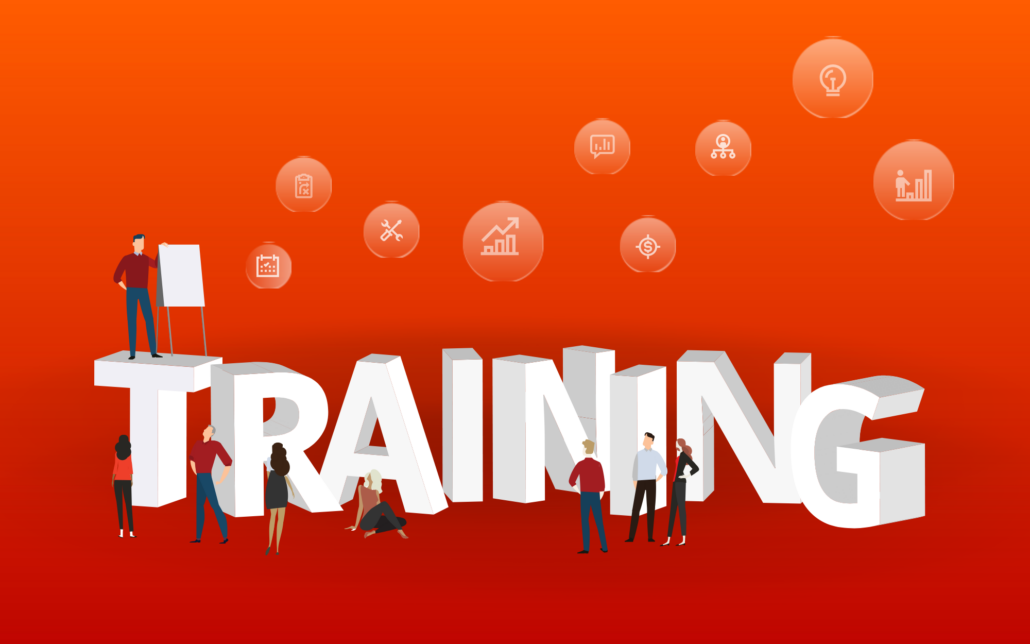
If you’re looking to smash your existing sales quotas and drive continuous growth for your company, you’re in the right place. Check out this blog for the top B2B sales training tips that leading industry experts swear by. Using the information below, you can learn how to foster authentic relationships, streamline your sales process, and secure high-stakes deals with finesse.
Table of Contents
Taking a Look at the B2B Sales Process
Understanding the B2B (business-to-business) sales process is essential for developing a strong sales strategy. B2B sales require a nuanced approach, tailored to the nature of organizational buying behavior.
Identifying the Key Stages
The B2B sales process follows a multi-stage model, which can be grouped into three major phases: lead generation, solution presentation, and deal closure. Let’s take a look at each phase:
- Lead Generation: This initial phase involves identifying potential clients and gathering leads. Here, you use market research, networking, and marketing campaigns to attract the interest of potential buyers.
- Solution Presentation: Once you’ve engaged a prospect, it’s time to demonstrate how your product or service can solve their specific problems. This may include product demos, proposals, and extensive Q&A sessions.
- Deal Closure: The final phase is closing the deal, which requires negotiation skills and an understanding of the client’s buying process. It’s crucial to address any last-minute objections and finalize the terms of the sale.
Understanding the Buyer’s Journey
The buyer’s journey in B2B sales is complex, non-linear, and almost always involves multiple stakeholders. To navigate this effectively:
- Identify the decision-makers and understand their roles in the purchasing process.
- Recognize the needs and pain points of the organization as a whole, as well as of individual stakeholders.
- Facilitate a smooth journey by providing relevant information and support at each stage of the process.
By taking a closer look at the B2B sales process and understanding its intricacies, sales professionals can better align their efforts with the needs and behaviors of their clients. This leads to more meaningful interactions, stronger relationships, and ultimately, success in closing deals.
Examining the Different Types of B2B Training
If you want your team to excel in B2B sales, they need to understand the varying training programs available and how they cater to different needs and learning styles. Let’s take a look at different training types that can elevate your team’s sales performance.
Department-Wide B2B Training Opportunities
Emphasizing a cohesive skill set across your team is crucial, and department-wide training sessions provide an excellent platform for collective learning. These sessions encourage a unified sales approach, ensure everyone has a baseline understanding of sales strategies, and foster an environment for shared knowledge and best practices.
One-On-One Sales Training Sessions
Personalized one-on-one training targets individual growth and helps in addressing specific strengths and weaknesses. It allows for tailored coaching sessions that focus on particular challenges or skills that a salesperson needs to develop, providing a more personalized approach to training and professional development.
Out-Of-Org Sales Training Programs
Exploring external sales training programs can impart fresh perspectives and innovative techniques that may not be available within the organization. These kinds of programs explore cutting-edge sales methodologies and tools, ridden with industry insights from seasoned sales experts from various sectors.
How to Design an Effective B2B Sales Training Program
The right B2B sales training program empowers your sales team and increases your company’s success rate. Designing such a program requires a clear understanding of what sales representatives need to know and the best practices to instill this knowledge. Here’s a concise guide to help you create a training program that offers value and delivers results.
Define Clear Training Objectives
Setting goals is the foundation of an effective training program. Determine what your sales team needs to accomplish and how training can help achieve these outcomes. Whether it’s improving negotiation skills, mastering product knowledge, or refining prospecting methods, each objective should be specific, measurable, achievable, relevant, and time-bound (SMART).
Customize Training Content
Sales roles aren’t uniform: training shouldn’t be either. Customize your training content to address the specific needs of different roles within your sales team. Analyze their day-to-day challenges and the skills required to overcome them. This targeted approach will make the training more relatable and effective.
Blend Different Learning Modalities
People learn differently. Using a combination of learning methods—like interactive workshops, one-on-one coaching sessions, and online modules—can cater to diverse learning styles. This mix also helps in reinforcing the learning material by presenting it in various formats.
- Incorporate role-playing exercises to simulate real-life scenarios.
- Utilize e-learning platforms for on-demand access to training resources.
- Provide ongoing coaching and feedback to reinforce learning.
Utilize Experienced Trainers
Consider leveraging internal or external trainers with real-world B2B sales experience. Trainers who have “been there, done that” can offer invaluable insights and credibility, fostering a more engaging and impactful learning environment.
Measure Training Effectiveness
Implementing methods to measure the effectiveness of your sales training program is crucial. Keep an eye on sales performance metrics before and after training to identify areas of improvement and success. Regular feedback from participants can also help refine the program over time.
Encourage Continuous Learning
Effective sales training isn’t a one-off event but an ongoing process. Encourage your team to engage in continuous learning. Use regular updates and refreshers to keep the information up to date and top of mind. The sales landscape is always changing, and your training program should evolve accordingly.
A Guide to Executing Your B2B Sales Training Plan
Kicking off a B2B sales training initiative requires careful execution to ensure its success. With a well-thought-out plan, you can create a powerful learning environment that empowers your sales team and drives business growth.
Follow the steps below to execute your B2B sales training plan effectively.
Setting the Stage for Training
Preparation is critical when it comes to training. Invest in a training environment that’s free of interruptions and ensure that all the necessary materials and resources are available. It’s important that your sales team is focused and ready to engage in the learning process.
Facilitating Engaging and Interactive Sessions
Engage your team with interactive sessions that encourage participation. Use real-world scenarios and role-playing exercises to make the training relatable and memorable. The goal is to not only share information but also to build skills that can be applied immediately.
Providing Tools and Resources
Equip your sales team with the latest tools and resources that support the training material. Access to sales collateral, case studies, and competitive analyses can make the training more applicable to their daily tasks.
Monitoring Progress and Adapting
When it comes to monitoring progress and adapting, here are a few tips:
Reinforcement: Sales training isn’t a one-time event. Reinforce learning with regular refreshers and updates to keep the knowledge fresh and applicable.
Feedback: Gather feedback throughout the training process to identify what’s working well and what areas need adjustment. Adapt the training plan accordingly to maximize its effectiveness.
Measurement: Measure your team’s progress using metrics and KPIs. This data can help you understand the impact of training and inform future training initiatives.
Encouraging a Culture of Continuous Improvement
Create an environment where continuous learning is valued and encouraged. Support your team in seeking out new skills and knowledge that can contribute to their sales success. Remember, the most successful B2B sales teams are those that continually adapt and evolve.
Keep Reading: Your Guide to Building a Lead-Generating SDR Team
Tips for Adjusting and Adapting Your B2B Sales Training Plan
Adapting your B2B sales training to your client’s changing needs is key to keeping your program relevant. The ability to recognize when and how to modify your sales strategies can significantly impact the success of your sales force. Here are some essential tips to ensure your B2B sales training plan remains agile and effective.
Analyze Sales Performance Regularly
Regular analysis of your sales team’s performance can highlight areas where your training may be falling short. By assessing metrics and KPIs, you can identify specific skills that need refinement or new strategies that should be incorporated into your training curriculum. Use this data to pinpoint which aspects of your plan require adjustments.
Request Feedback from Sales Teams
Feedback from those on the front lines is invaluable. Encourage your sales representatives to provide feedback on what they find helpful in the current training program and what could be improved. Their insights can help you tailor your training to address real-world challenges they face in the B2B arena.
Incorporate Flexibility into Training Modules
Flexibility is key to adapting your training plan. By designing modules that can be easily updated or reconfigured, you ensure that your training material can quickly adapt to changing industry trends or shifts in your business strategy without a complete overhaul each time.
Embrace New Technologies and Tools
Technology is continually evolving so your training programs should too. Stay on top of new sales tools, platforms, and technologies that can give your team an edge. Incorporate these tools into your training to ensure your sales team remains tech-savvy and efficient.
Set Clear Goals for Training Outcomes
Without clear goals, measuring the success of your training program can be challenging. Establish concise, measurable outcomes for each training session and overall program. Adjust these objectives as necessary to meet the evolving needs of the market and your organization.
Encourage a Culture of Continuous Learning
Foster a work environment that values ongoing education and professional development. By promoting a culture of continuous learning, you empower your sales team to seek out additional training opportunities and stay informed on best practices independently.
Key Takeaways
Let’s hit on the key points that we’ve covered in this blog.
- Make Sure to Understand the Sales Process: A deep understanding of the B2B sales process is crucial for creating training that aligns with real-world scenarios.
- Training Isn’t One Size Fits All: Different teams have varied needs. Choose the right type of training—be it online, in-person, or hybrid—to suit these requirements.
- Execution Is Key: A meticulously executed training plan is the linchpin of success; ensure resources and schedules are well-planned.
- Your Business Needs to Stay Adaptive: Regularly adjust and adapt your training plan based on feedback and changing market dynamics to stay relevant and effective.
- Embrace Trends As They Come: Keep an eye on future trends and integrate fresh insights into your training to stay ahead of the curve.
Overall, following these tips will solidify your team’s capabilities and position your enterprise for sustained success in our ever-evolving B2B marketplace.
Looking to position yourself for success? Consider starting a partnership with Abstrakt Marketing Group’s exceptional B2B sales team.Using a strategic process and proven sales techniques, we build pipelines and get our exclusive partners guaranteed appointments for less than the cost of one full-time employee. Get in touch with us today to get started.



